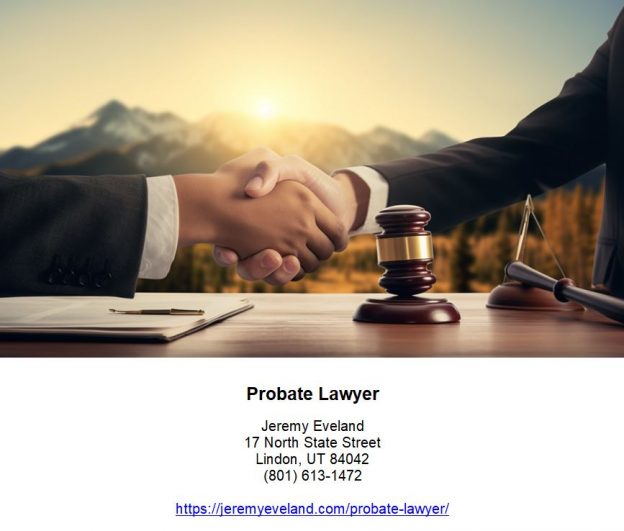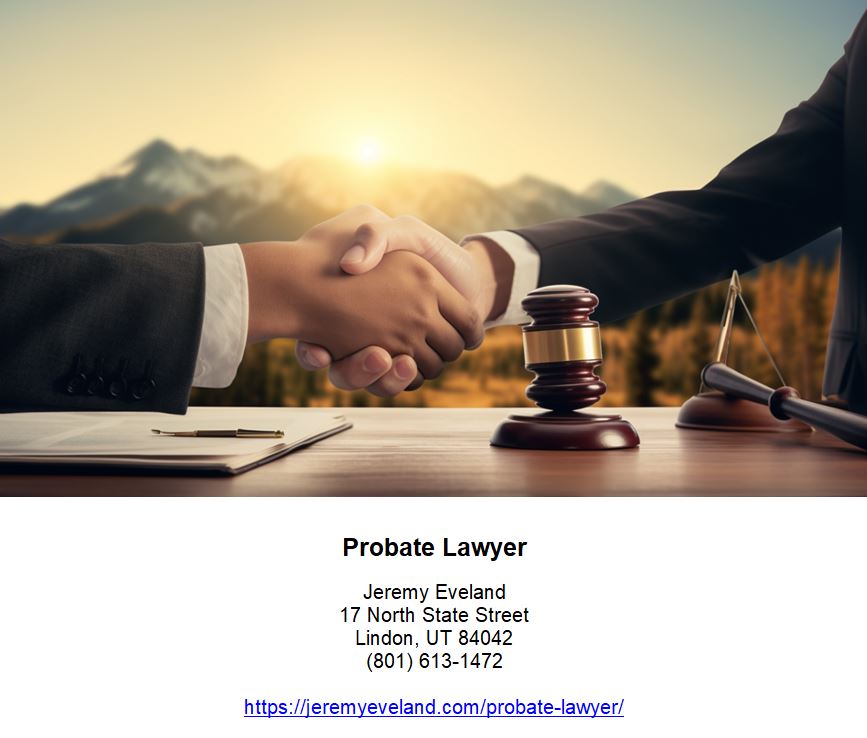Are you dealing with the complex legal process of probate? Look no further, as a probate lawyer is here to guide you through every step of the way. Whether you are facing challenges with estate administration, distributing assets, or resolving disputes among beneficiaries, a probate lawyer has the expertise and knowledge to navigate these intricate matters. This comprehensive article will provide you with a clear understanding of probate, address common concerns, and offer reassurance for those seeking guidance. By incorporating important information and creating emotional connections, you will feel empowered to take the next step and seek the assistance you need. So why wait? Call the number listed on our website for a consultation today.
What is Probate?
Probate is a legal process that takes place after someone passes away. It involves the validation of the deceased person’s will, the identification and appraisal of their assets, the payment of their debts and taxes, and the distribution of their remaining assets to the rightful heirs or beneficiaries. This process ensures that the deceased person’s final wishes are carried out and that their estate is properly settled.
Definition
Probate is the legal process by which a deceased person’s assets are distributed and their debts are paid. It involves the appointment of a personal representative or executor who administers the estate, ensures the proper distribution of assets according to the will or state laws, and resolves any legal issues that may arise.
Purpose
The primary purpose of probate is to ensure the orderly transfer of a deceased person’s assets to their heirs or beneficiaries. It provides a legal framework that protects the rights of all parties involved and ensures that the final wishes of the deceased are respected and carried out. Probate also serves to settle any disputes that may arise regarding the distribution of the assets and provides a transparent process for all parties involved.
Process
The probate process typically begins with the filing of a petition with the probate court. This petition includes the deceased person’s will, if one exists, and requests the appointment of a personal representative or executor. Once appointed, the personal representative is responsible for gathering and inventorying the deceased person’s assets, paying off any outstanding debts and taxes, and distributing the remaining assets to the rightful heirs or beneficiaries. Throughout the process, the personal representative must adhere to the probate laws and regulations of the jurisdiction in which the probate takes place.
When is Probate Necessary?
Probate is necessary in several situations, including the following:
Intestate Succession
Probate is necessary when a person passes away without a valid will. In this situation, the deceased person’s assets are distributed according to the laws of intestate succession, which vary from state to state. The probate process ensures that the assets are distributed to the rightful heirs in accordance with these laws.
Large Estate
If the deceased person’s estate is large and complex, probate may be necessary to handle the distribution of assets and resolve any legal issues that may arise. Large estates often involve multiple properties, businesses, investments, and other valuable assets that require careful evaluation and distribution.
Complex Asset Distribution
Probate may also be necessary when the deceased person’s assets are difficult to distribute without legal intervention. This can include assets held in different locations or countries, assets subject to complex ownership arrangements, or assets that are disputed by potential heirs or beneficiaries. The probate process ensures that these assets are properly evaluated, managed, and distributed according to the law.
Benefits of Hiring a Probate Lawyer
Hiring a probate lawyer can provide numerous benefits and make the probate process much smoother and more efficient. Here are some of the key benefits of hiring a probate lawyer:
Expertise in Probate Laws
Probate laws can be complex and vary from state to state. A probate lawyer has extensive knowledge and expertise in these laws and can ensure that the probate process complies with all legal requirements. They can help navigate through the complexities of the legal system, interpret the deceased person’s will, and handle any legal issues that may arise during the probate process.
Guidance in the Probate Process
The probate process can be overwhelming, especially for individuals who have never gone through it before. A probate lawyer can provide invaluable guidance and support throughout the process, explaining the necessary steps, providing timelines and deadlines, and assisting with the preparation and filing of all required documents. They can also help handle any disputes or challenges that may arise during the probate process.
Reduced Stress and Burden
Losing a loved one is already a difficult and emotional time. The probate process can add additional stress and burden to an already challenging situation. Hiring a probate lawyer can help alleviate some of this stress by handling the legal aspects of the probate process, allowing you to focus on grieving and healing. They can take care of all the legal paperwork, communication with the court and other parties involved, and ensure that you are well-informed and supported throughout the process.
Finding a Probate Lawyer
Finding a probate lawyer who is experienced, trustworthy, and compatible with your needs is crucial to ensuring a smooth and successful probate process. Here are some ways to find a probate lawyer:
Online Search
One of the most common ways to find a probate lawyer is through an online search. Use search engines to find local probate lawyers in your area and explore their websites to learn more about their expertise, experience, and services. Reading client reviews and testimonials can also give you insights into their reputation and the satisfaction of their previous clients.
Referrals
Another effective way to find a probate lawyer is through referrals from friends, family, or professionals you trust. Ask for recommendations from people who have gone through a similar situation or consult other attorneys who specialize in different areas of law. They may be able to provide you with recommendations or point you in the right direction.
Consultation Process
Once you have found a few potential probate lawyers, schedule consultations with them to discuss your case, evaluate their expertise, and determine if they are the right fit for you. During the consultation, ask about their experience in probate law, their approach to handling cases, their fees, and any other questions or concerns you may have. Take note of how comfortable you feel with the lawyer and how well they communicate with you, as these factors are essential for a successful attorney-client relationship.
Choosing the Right Probate Lawyer
Choosing the right probate lawyer is a critical decision that can greatly impact the outcome of the probate process. Here are some key factors to consider when selecting a probate lawyer:
Experience and Specialization
Look for a probate lawyer who has extensive experience in handling probate cases. Probate law can be complex, and hiring a lawyer who specializes in this area ensures that you are working with someone who has in-depth knowledge and expertise in the field. Consider their track record of success in handling similar cases and their familiarity with the local probate laws and court procedures.
Reputation
A probate lawyer’s reputation is an essential factor to consider when making your decision. Research their reputation by reading client reviews, testimonials, and any feedback available online. Look for a lawyer who is known for their professionalism, integrity, and dedication to their clients. A good reputation indicates that they are trusted and respected in the legal community and have a track record of providing excellent service to their clients.
Communication and Accessibility
Clear and effective communication is crucial in any attorney-client relationship. When choosing a probate lawyer, consider how well they communicate with you during the initial consultation and how accessible they will be throughout the probate process. Look for a lawyer who listens to your concerns, explains complex legal concepts in a way you can understand, and promptly responds to your questions and inquiries. Open and transparent communication will ensure that you are well-informed and involved in the probate process.
Cost of Hiring a Probate Lawyer
The cost of hiring a probate lawyer can vary depending on several factors, including the complexity of the case, the lawyer’s experience and reputation, and the location of the probate. Here are some common fee structures used by probate lawyers:
Hourly Rates
Many probate lawyers charge an hourly rate for their services. The exact hourly rate can vary significantly depending on the lawyer’s experience and location. Generally, more experienced and reputable lawyers will have higher hourly rates. Keep in mind that the total cost will depend on the number of hours spent on your case, so make sure to discuss the estimated time frame and potential costs with your lawyer.
Flat Fees
Some probate lawyers may offer flat fees for specific services or for handling the entire probate process. A flat fee provides more predictability and allows you to budget for the legal fees. This fee will typically cover the lawyer’s services from the beginning of the probate process until its completion. Make sure to clarify what services are included in the flat fee and any additional costs that may be incurred.
Contingency Fees
Contingency fees are less common in probate cases, but they may be used in certain situations. Under a contingency fee arrangement, the lawyer’s fee is based on a percentage of the value of the assets involved in the probate. This type of fee structure is often used when there is a potential for a substantial recovery or when the estate is involved in a lawsuit. Discuss the contingency fee arrangement with your lawyer to understand the specific terms and conditions.
Understanding the Probate Process
Understanding the probate process can help you navigate through this complex legal procedure. Here are the main steps involved in the probate process:
Filing the Petition
The probate process begins with the filing of a petition in the appropriate probate court. The petition includes the deceased person’s will, if one exists, and requests the appointment of a personal representative or executor. The court will review the petition and, if everything is in order, issue the necessary legal documents to formally begin the probate process.
Inventory and Appraisal of Assets
Once the personal representative is appointed, their first task is to gather and inventory all the assets of the deceased person’s estate. This includes bank accounts, real estate, investments, personal property, and any other assets owned by the deceased. An appraisal may be necessary to determine the fair market value of certain assets, especially if they are subject to estate taxes.
Debts and Claims
The personal representative is responsible for notifying creditors of the deceased person’s passing and for settling any outstanding debts or claims against the estate. They will review the claims, evaluate their validity, and negotiate with creditors to reach a settlement. If necessary, the personal representative may need to sell some assets to pay off the debts and claims.
Distribution of Assets
Once all debts, taxes, and expenses have been paid, and any necessary court approvals have been obtained, the personal representative can proceed with the distribution of the remaining assets to the rightful heirs or beneficiaries. This distribution will be carried out according to the deceased person’s will, if one exists, or according to the laws of intestate succession if there is no will. The personal representative is responsible for ensuring that the assets are distributed accurately and in accordance with the law.
Legal Documents Involved in Probate
Several legal documents play a crucial role in the probate process. Here are some of the key documents:
Will
A will is a legal document that outlines the deceased person’s final wishes regarding the distribution of their assets. It appoints an executor to manage the estate and specifies how the assets should be distributed among the beneficiaries. The will must be filed with the probate court and validated during the probate process.
Letters of Administration
Letters of administration are legal documents issued by the probate court that appoint a personal representative or executor to administer the estate when there is no will or the named executor is unable or unwilling to serve. The letters of administration give the personal representative the legal authority to act on behalf of the estate.
Letters Testamentary
Letters testamentary, also known as letters of administration with will annexed, are legal documents issued by the probate court that appoint an executor to administer the estate when there is a will, but the named executor is unable or unwilling to serve. The letters testamentary give the appointed executor the legal authority to carry out the duties and responsibilities outlined in the will.
Challenges to a Will
Challenges to a will can arise for various reasons. The probate process provides a mechanism to address these challenges and ensure the validity and enforceability of the will. Here are some common challenges to a will:
Lack of Testamentary Capacity
One of the most common challenges to a will is a claim that the deceased person did not have the necessary testamentary capacity to create a valid will. Testamentary capacity refers to the mental ability of a person to understand the nature and extent of their assets and the consequences of distributing those assets through a will. A probate court will evaluate the evidence and determine if the deceased person possessed the required mental capacity when the will was created.
Undue Influence
Another challenge to a will can arise if there are allegations of undue influence. Undue influence occurs when someone exerts pressure on the deceased person to change their will in a way that benefits them or disadvantages others. This can include situations where the deceased person was manipulated, coerced, or deceived into making changes to their will that do not reflect their true intentions. The probate court will carefully evaluate the evidence presented and determine if undue influence was a factor in the creation of the will.
Fraud or Forgery
In some cases, a will may be challenged based on allegations of fraud or forgery. This occurs when there is evidence that the deceased person’s signature on the will is not genuine or that the will itself was created under fraudulent circumstances. The probate court will thoroughly investigate any claims of fraud or forgery and determine the authenticity of the will.
Frequently Asked Questions
What is the role of an executor?
The role of an executor is to manage the deceased person’s estate and ensure that their final wishes, as outlined in the will, are carried out. The executor is responsible for handling the probate process, gathering and inventorying the assets, paying off any debts and taxes, and distributing the remaining assets to the rightful heirs or beneficiaries. The executor must act in the best interests of the estate and follow the instructions provided in the will.
How long does the probate process take?
The duration of the probate process can vary depending on several factors, including the complexity of the case, the size of the estate, and the efficiency of the probate court. In general, the probate process can take anywhere from several months to a year or more. Complex cases or cases involving disputes or challenges to the will may take longer to resolve.
Can I contest a will after probate?
In most jurisdictions, there is a limited window of time during which a will can be contested after probate. This time frame varies from state to state but is typically around a few months to a year after the probate process is completed. If you believe that there are valid grounds to contest a will, it is crucial to consult with a probate lawyer as soon as possible to determine the appropriate legal action to take.
In conclusion, probate is a necessary legal process that ensures the orderly distribution of a deceased person’s assets and the settlement of their debts. Hiring a probate lawyer can provide expertise, guidance, and peace of mind throughout the probate process. When choosing a probate lawyer, consider their experience, reputation, and communication style. Understanding the probate process, the legal documents involved, and the challenges that may arise can help you navigate through this complex legal procedure. Keep in mind that the cost of hiring a probate lawyer can vary, and different fee structures may be used. It is essential to clarify the fees and payment terms with your lawyer upfront. If you have any further questions or concerns about probate, consult with a probate lawyer to get personalized advice and assistance.






























